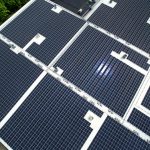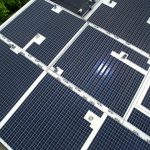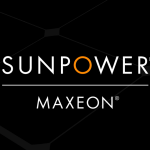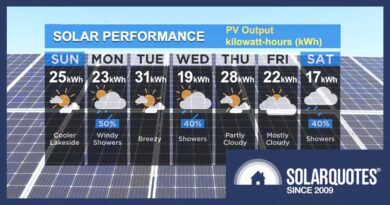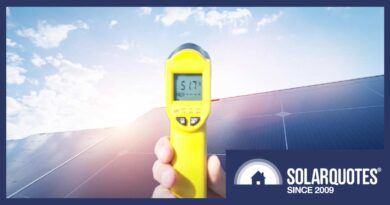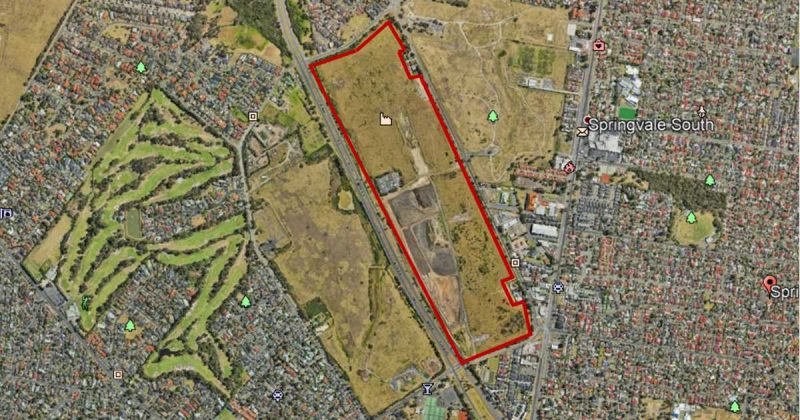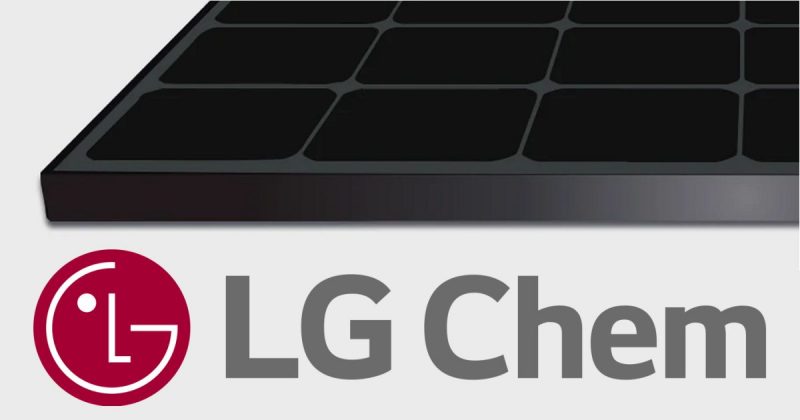A Deep Dive Into REC Solar Panel Warranties

Image: Midjourney, Prompt “a bearded man diving into a warranty document”
REC produces premium solar panels. That means they’re not cheap, but they are high quality. The company was Norwegian, but its headquarters are now in Singapore, along with its sole factory. This article will be a deep dive into REC solar panel warranties. I’ve already put on a wetsuit and spent all week honing my Jacques Cousteau impersonation, so I’m prepared to provide all the details you could possibly want.
In this article, I’ll explain…
- How the high reliability of REC solar panels can avoid the need for warranty claims in the first place.
- Details of both their Performance and Product warranties.
- How REC Alpha series panels’ performance warranty is equal best in the world in terms of permitted annual deterioration.
- The extra protection provided by the REC Protrust Warranty.
- How to find where REC hides their warranty documents on their website.
- The bad news hidden in the warranty fine print.
But before diving into all that, I’ll briefly go over why using the manufacturer’s warranty to make a claim is not the first thing you should do if there’s a problem with your solar system.
Non-Warranty Protection
This article is going to focus on the warranties REC provides. But the manufacturer’s warranties are not the only protection you have. If you think there’s a problem with your solar panels, contacting your installer should be the first step you take. Provided you chose a good solar installer, this will — hopefully — also be the last step you have to take. They took your money in return for providing a functional solar power system and are obligated to ensure that’s what you receive. But if they’re no longer around, you can use the manufacturer’s warranties to make a claim.
Australian Consumer Guarantees also protect us. These apply regardless of a product’s warranties. A manufacturer with good customer service will honour their Consumer Guarantee obligations, but not all companies have good customer service. In these cases, a good warranty can make it easier to get them to provide the support they should.
Manufacturer’s warranties are supposed to be extra protection that’s additional to Consumer Guarantees. But every manufacturer’s warranty I’ve seen offers less protection than what’s provided by Australian Consumer Guarantees. For this reason, if you make a claim using the manufacturer’s warranty and you don’t receive support, you may need to fall back on Consumer Guarantees.
REC & Reliability
A good solar panel warranty is a good thing to have. But what’s even better is having reliable solar panels that never require a warranty claim in the first place. While the only figures I have come from REC themselves, the consensus is their panels are reliable. I don’t recall ever hearing of anyone having problems with them.
Like all good manufacturers, REC has worked hard to improve the reliability of its solar panels in a range of ways. One feature easy to show in a photo is two crossbars on the frames that provide additional strength and reduce the slow deterioration in performance that can come from years of mild flexing in the wind.
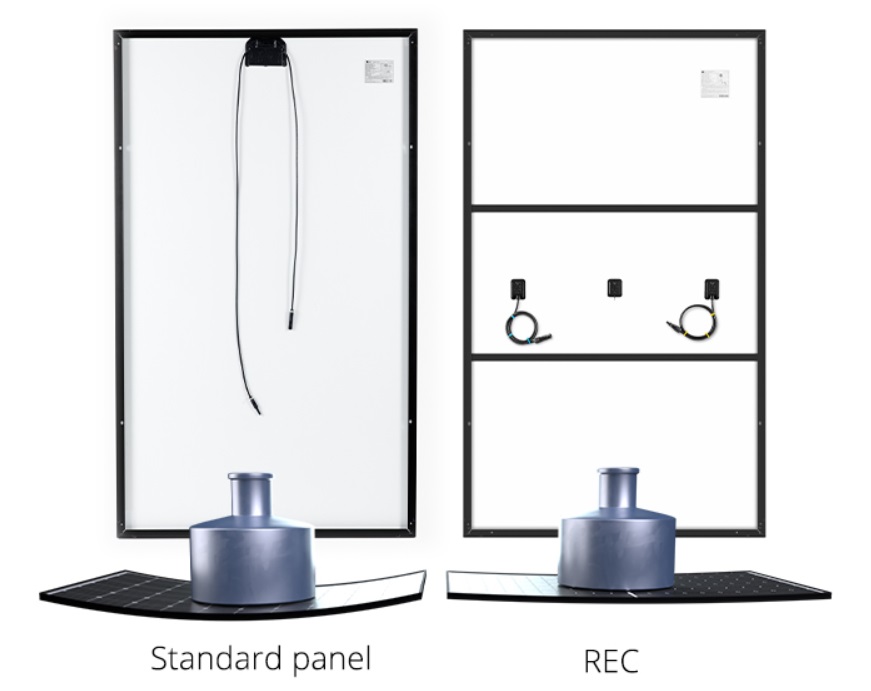
Those crossbars can apparently dig into shoulders when REC panels are carried. Fortunately for us, solar installers are willing to suffer for their art.
Despite what’s shown in the illustration above, it’s important to resist the temptation to place heavy weights on solar panels to see how bendy they get.
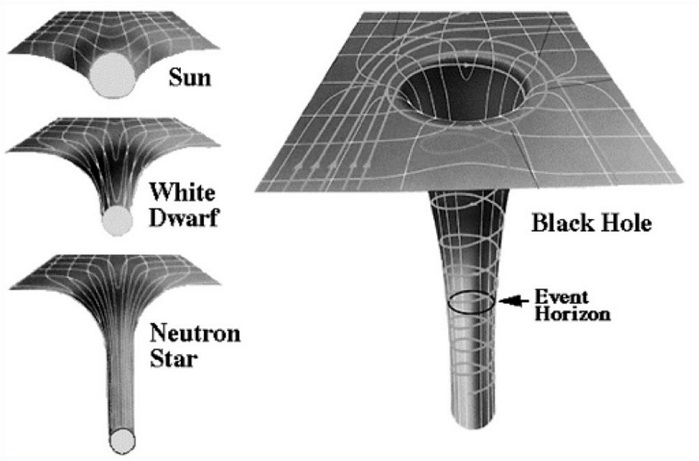
This is completely unacceptable.
Their attempts to improve reliability appear to be successful because — according to REC — in 2020, they only had around 52 warranty claims per million panels:
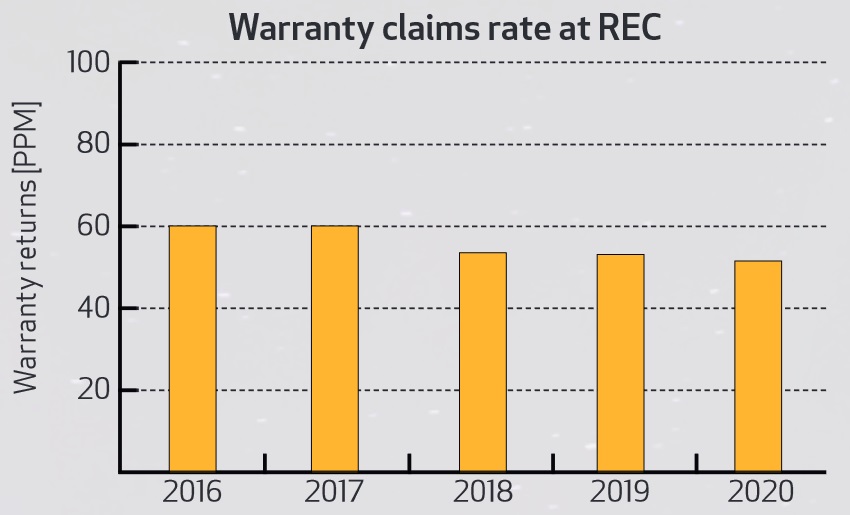
(No, I don’t know why there are little whitish splotches on this graph.)
This makes the chance of a REC panel being involved in a warranty claim in 2020 around 0.005%. An impressively low probability. But in real life, the actual failure rate is unlikely to be as low as this makes it appear. The stock of installed panels in 2020 would have been relatively young, and their failure rate is likely to increase as they age. Despite this, if you have a roof full of REC solar panels, the odds should be excellent that they’ll operate for 25 years without problem.
REC’s 3 Solar Panel Warranties
REC currently produces four different panel lines. Below I’ve placed them in order from most efficient to least efficient. It’s also most expensive to least expensive:
- REC Alpha Pure-R: A high-efficiency, lead-free panel.
- REC Alpha Pure: A lead-free panel that’s not quite as efficient as the R type.
- REC TwinPeak 5: A more affordable panel that isn’t lead-free, but — like all modern panels — it doesn’t contain much.
- REC TwinPeak 4: An older and lower-cost version of the TwinPeak 5
REC provides these panels with up to three types of warranty protection:
- Performance Warranty: This is for 25 years and specifies the performance of the panel will not fall below a specific amount for each of these years.
- Product Warranty: This covers any manufacturing defects in the panels and is for 20 years. But it increases to 25 years if the installer is REC certified.
- REC Protrust Warranty: This covers the labour cost of any work carried out under warranty if a REC certified installer is used. It lasts 25 years for installations under 25 kilowatts (kW) and 10 years for installations from 25 to 500kW.
Performance Warranty
The Performance warranty for all REC panels lasts for 25 years. This is the standard length for solar panels. What is not standard is the maximum amount of panel degradation allowed for the Alpha series, which is the lowest in the world. SunPower Maxeon panels are the only ones I’m aware of that share the same low rate — although, at 40 years, Maxeon’s Performance warranty lasts a lot longer.
The warranties promise all REC panels will retain at least 98% of original capacity in their first year, while the maximum annual degradation permitted for the following 2 to 25 years are:
- Alpha Pure Panels: Maximum annual degradation of 0.25%. Minimum of 92% of the original performance in year 25.
- TwinPeak Panels: Maximum annual degradation of 0.25%. Minimum of 86% of the original performance in year 25.
Product Warranty
The Product warranty covers any defects in the panels that are present upon arrival or that become apparent through normal use and which aren’t a simple drop in performance. This is 20 years for all current REC panels or 25 years if the installer is REC certified.
How can you tell if an installer is REC certified? Well, if they’re offering a 25 year product warranty, that’s a good way to tell. The large majority of installers offering these solar panels are REC certified, so in most cases, the product warranty will be for that long. This is a hefty length of time and, until relatively recently, it was rare for panels to have quarter of a century product warranties.
Remedies
If there is a problem with a panel under the product or performance warranties, REC says they get to decide which of these three things they will do:
- Repair it. (This never happens in practice, but all solar panel warranties pretend that repairs are a possibility.)
- Replace it. Alternatively, for the performance warranty, they can provide additional panels to make up for the system’s loss of performance. This is nuts because normally it’s not possible and almost never practical to tack extra panels onto a solar system.
- Provide a refund equal to the current market price of an equivalent product.
REC Protrust Warranty
If the installer is REC certified — which they generally are — then REC will also provide their Protrust warranty for installations of 500kW or less. This will pay for the labour cost of any warranty work for 10 years if the installation is 25 to 500kw or 25 years for those under 25kW. As nearly all rooftop solar systems are under 25kW, nearly all will get the 25 year period.
This may not seem impressive, as it’s what you should receive under Australian consumer guarantees anyway. But having this covered under warranty can make claims quicker and easier if a company is unwilling to live up to their obligations under Australian consumer law.
Finding Warranty Info
Before go into what I found in the fine print says, I should tell you how to find the warranties so you can check them yourselves. Slapping eyes on them is more difficult than it needs to be. Whether you go to the REC Solar Australian site or their international English page, nothing in the menus specifically says “Warranty”. Instead, you have to click on their download symbol, which has the misfortune of looking like this…

I realize their download symbol is supposed to look like information coming out of a cloud…

…but it looks like Patrick Stewart playing the poop emoji.
After clicking on that and thoroughly disinfecting your mouse cursor or fingertip, you can click “Product downloads”…
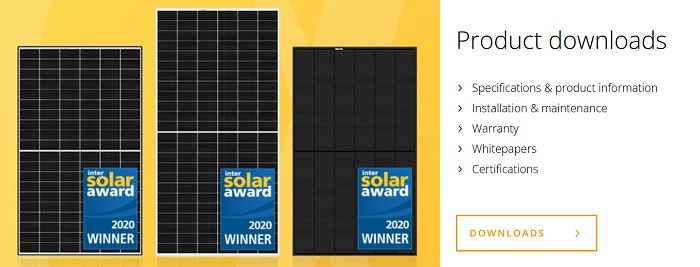
…and that will let you select “Warranty” and download all the documents relating to that:
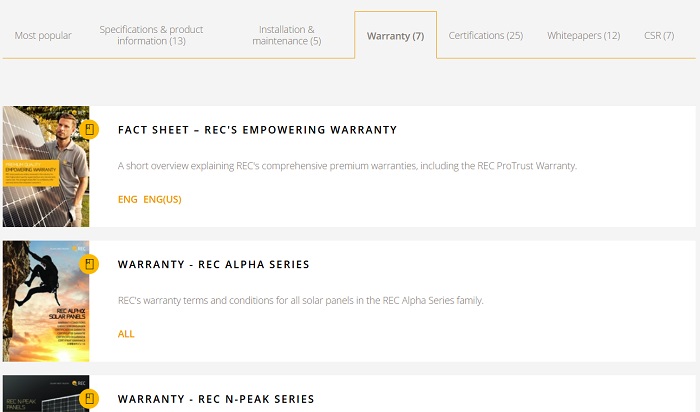
The Fine Print
Like every solar panel warranty I’ve ever seen, there are problems in the fine print. On the bright side, it’s not the worst solar panel small print I’ve ever seen. I was even able to find a good point where it states the warranty is transferrable:
- The warranties are transferable: If you sell your home, provided the panels stay where they were originally installed, their performance and product warranties can be transferred to the new owner.
- Panel performance can be 3% less than the performance warranty allows: The performance warranty says to make a claim, panels must be either tested by REC or an independent tester with an allowance for error of plus or minus 3%.
- Singapore law applies: The warranty shall be, “…governed by and construed in accordance with the laws of Singapore…” Do you have any idea what the laws of Singapore are? If you don’t, are you going to pay for a lawyer who does know? I suspect it will be a lot easier to just insist they honour their obligations under Australian Consumer Guarantees. But note I’m no lawyer myself, so this isn’t any kind of legal advice.
One Of The Better Solar Panel Warranties Around
Like all solar panel warranties I’ve seen, REC’s are far from perfect. Despite this, provided your installer is REC certified and you get the 25 year product warranty and the REC Protrust warranty, then REC provides one of the best sets of warranties around. This isn’t saying much and you may still be forced to rely on Australian Consumer Guarantees to get a good result if need to make a claim but — when graded on a curve compared to other manufacturers and given how awful their warranties nearly all are — REC’s warranties are….
…This is harder for me to say than I thought it would be…
…REC’s warranties are… good.
But hopefully, if you get REC solar panels, their reliability will mean you’ll never have to resort to using their warranties.
In this year’s SolarQuotes Installers’ Choice Awards, REC were voted the best solar panels in 2023, and also took out gold for the best support.
Original Source: https://www.solarquotes.com.au/blog/rec-solar-warranties/




